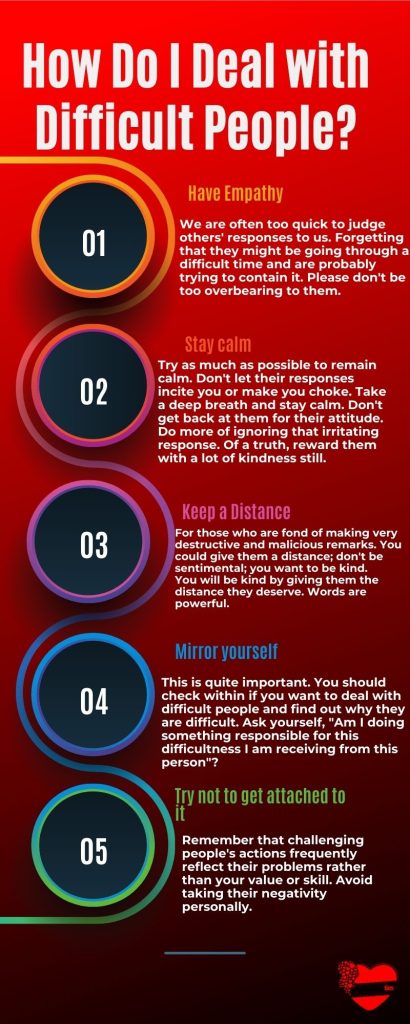Dealing with difficult people can be challenging, but with these expert tips, you can improve your ability to handle these situations effectively.
Learn how to understand their perspective, stay calm, set boundaries, and find solutions. Practice active listening, use ‘I’ statements, and seek support. Take care of yourself, practice empathy, and be assertive.
Find common ground, use humor, and focus on the positive. Practice mindfulness, seek meditation if necessary, and learn from the experience.
Develop emotional intelligence, maintain professionalism, and be open to feedback. Practice patience and know when to walk away. Implement these strategies to navigate difficult encounters more effectively.
When interacting with challenging individuals, many of us encounter challenges in our personal and professional lives.
Effectively managing hard situations, from a demanding supervisor, a challenging family member, or a difficult coworker, can greatly impact our overall performance and well-being.
This article provides a full guide on dealing with difficult people in relationships. Carefully read through and you will be glad you did.
Characteristics of a Difficult Person: Signs of Difficult People and What Makes Them Tough
Dealing with difficult people is an inevitable part of life, whether in the workplace, social circles, or even within our own families.
These individuals can make our lives challenging and drain our energy. It’s important to recognize the signs of difficult people and understand what makes them tough to navigate.
We can develop strategies to handle these characteristics and maintain our well-being effectively by identifying them.
1. Constant Negativity
One of the sure signs of a difficult person is their constant negativity. They tend to focus on the negative aspects of any situation, often dismissing any optimistic viewpoints. Their negative energy can be contagious and bring down the morale of those around them.
2. Lack of Empathy
Difficult people often struggle with empathy. They find it challenging to understand or relate to the emotions and experiences of others.
This lack of empathy can lead to dismissive behavior, making it difficult to establish meaningful connections or resolve conflicts.
Interestingly, you can read about What is Cupioromantic Meaning | 15 Signs of Being Cupioromantic
3. Inflexibility
Inflexibility is another characteristic that makes dealing with difficult people tough. They have a rigid mindset and are resistant to change or alternative perspectives.
This inflexibility can hinder collaboration and compromise, making it challenging to find common ground or reach mutually beneficial solutions.
4. Manipulative Behavior
Difficult people may resort to manipulative tactics to get their way. They use subtle or overt manipulation techniques to control situations or people around them. This behavior can create a toxic environment and erode trust within relationships.
5. Poor Communication Skills
Effective communication is crucial for healthy and dynamic relationships, but difficult people often lack this skill. They may struggle with expressing themselves clearly, listening attentively, or understanding the impact of their words. Poor communication can lead to misunderstandings, conflicts, and frustration.
6. Boundary Issues
Difficult people often have boundary issues. They may overstep personal boundaries, invade privacy, or disregard the boundaries set by others. This can make it challenging to establish and maintain healthy boundaries, leading to feelings of discomfort and violation.
Read Also: 15 Deep Conversation Topics For Building Bond
7. Resistance to Feedback
Constructive feedback is an essential part of personal and professional growth. However, difficult people often resist feedback and become defensive when their actions or behavior are questioned. This resistance can hinder their ability to learn from their mistakes and improve their relationships.
8. Constant Need for Control
Difficult people have a strong desire for control and may exhibit controlling behaviors. They often struggle with trusting others and feel the need to micromanage or dictate every aspect of a situation. This need for control can create tension and limit the autonomy of those around them.
9. Lack of Accountability
Difficult people often have difficulty taking responsibility for their actions. They may deflect blame onto others, make excuses, or deny any wrongdoing. This lack of accountability can hinder personal growth and prevent the resolution of conflicts.
10. High Drama and Conflict
Difficult people tend to thrive on drama and conflict. They may create or escalate situations to gain attention or control. This constant state of conflict can be exhausting and drain the energy of those involved.
How Do I Deal with Difficult People in a Relationship?
Dealing with difficult people is a challenge many of us face in our personal and professional lives. Knowing how to handle these situations effectively can significantly impact our overall well-being and success, whether it’s a difficult coworker, a demanding boss, or a challenging family member.

1. Have Empathy
We are often too quick to judge others’ responses to us. Forgetting that they might be going through a difficult time and are probably trying to contain it. Don’t be too overbearing to them.
You might have to calm down and be understanding. I seek to give excuses on their behalf. Show them love and help them know that you truly care.
2. Stay calm
Try as much as possible to remain calm. Don’t let their responses incite you or make you choke. Take a deep breath and stay calm. Don’t get back at them for their attitude. Do more of ignoring that irritating response. Of a truth, reward them with a lot of kindness still.
Read Also: 95+ Cute Love Paragraphs for Him that Will Melt His Heart
3. Keep a Distance
For those who are fond of making very destructive and malicious remarks. You could give them a distance; don’t be sentimental; you want to be kind.
You will be kind by giving them the distance they deserve. Words are powerful. They have a way of playing hard on your mind and making you feel good about yourself and your results or worse.
4. Establish boundaries
As much as possible, try not to get into conflicts. Try hard, please. This is because it could get messy.
You might need to establish boundaries to keep your sanity. This point and distance mean the same thing. With boundaries, there is still access, but it’s very restricted. Distancing will mean not getting anywhere near. Be serious about enforcing boundaries.
5. Mirror yourself
This is quite important. You might need to check within if you want to deal with difficult people and find out why they are difficult. Ask yourself, “Am I doing something responsible for this difficultness I am receiving from this person”?
A closer look at yourself will tell if you can handle the difficult reaction you are getting from that person.
6. Find someone who Can help you
There might be someone who can help you. The person could help by having a conversation with the difficult person.
Such a person could be a friend, a family member, or someone you know who can talk some sense into him/her. You also need to be smart about telling the helper to be diplomatic about his presentation or how he/she can handle the troublesome person. This is so the situation doesn’t worsen.
7. The Ignore trick
One of the best ways to deal with difficult people is to play the ignore trick on them.
Sometimes, you have to pretend some things don’t exist. Don’t give them attention. Focus your energy and attention on things that add value to you, not persons who try to drain you.
Just ignore!
10. Don’t demand compliance.
You sometimes can’t force people to do what they don’t want. These people are already difficult, and demanding compliance will worsen things. Don’t change them. Changing them by demanding compliance could birth resentment.
11. Recognize their viewpoint
Attempt to comprehend the other person’s perspective by placing yourself in their shoes. This can assist you in finding common ground and approaching the situation with empathy.
12. Remain composed
When dealing with challenging individuals, it’s imperative to maintain composure. Reacting angrily or frustratedly will make things worse and make agreeing more difficult.
13. Pick Your Battles
Not every conflict merits involvement. Evaluate the circumstances and decide if you should intervene or if it’s best to let some things go.
14. Remove your emotions
When you cannot but relate with tiresome people, you might have to detach your feelings and get the job done or do what you must. This is maturity.
15. Pay Attention to the Fix
Instead of becoming bogged down in the issue, concentrate on coming up with solutions. This proactive stance can facilitate the advancement of the discussion and result in a resolution.
16. Engage in Active Listening
Pay close attention to the worries of the challenging individual and acknowledge their emotions. This might ease tension and demonstrate your sincere desire to find a solution.
17. Employ “I” Declarations
Use “I” statements to voice your worries so as not to come across as accusing. Use phrases like “I feel” rather than “You always” to keep the conversation moving.
18. Be stern
When a difficult person has been lazy or pushing responsibility, rebuke would be needed. You could reprimand the fellow (if you are the boss). Don’t feel you should let it slide. If everyone were acting difficult, the workplace would be empty.
19. Take a walk/excuse yourself
When a difficult person’s attitude gets to you, disgusts and infuriates you. Excuse yourself, especially when you confront such and try to share your side of the view. Spiting very mean words could be such that you would regret it.
20. Find a Common Ground
Find something equalizing or keeping you two at bay and help promote conversations later. It could be just something you guys share in common. Even with this, be careful not to be drawn and support toxic characters, all in the name of finding common ground.
21. Take Care of Yourself
Managing challenging individuals can be emotionally taxing. Take care of yourself by doing things that help you unwind and feel good about yourself.
22. Try not to get attached to it
Remember that challenging people’s actions frequently reflect their problems rather than your value or skill. Avoid taking their negativity personally.
23. Make an assertive
The secret to coping with challenging individuals is assertiveness. State your opinions, sentiments, and boundaries assertively and concisely without being hostile or submissive.
24. Make a joke
Laughter is a great way to relieve stress and lighten the atmosphere. Make judicious use of it to assist in defusing tight circumstances.
25. Take a Rest
Step back and give yourself room if things are too much to handle. A brief hiatus can occasionally obtain perspective and clarity.
26. Pay Attention to the Good
Turn your attention to the good things about the person or the circumstance. This can lessen your tension and help you keep a more positive attitude.
Read Also: What is Self-preservation Meaning? Signs and How to deal with it
27. Communicate Non-Verbal
Observe how you carry yourself and how you express yourself. A lot of information can be communicated by nonverbal cues, which can also affect the conversation’s tone.
28. Engage in Mindfulness
When interacting with challenging individuals, maintain awareness and presence. This can assist you in responding more carefully than hastily.
29. Try to Mediate
If things get out of control, you should consider getting mediation from an impartial third party. A mediator can assist in facilitating a productive dialogue and resolving conflicts.
30. Make use of your emotional intelligence
You can increase your emotional intelligence by being aware of and in control of your emotions and those of others. This can make it easier for you to handle challenging situations.
31. Stay Receptive to Input
Pay attention to what the challenging individual says, and keep an open mind about yourself. There could be certain things you can do to make your approach or communication better.
32. Show Some Patience
It takes patience to deal with unpleasant people most of the time. Recognize that change takes time, and be prepared to give the individual a chance to develop.
33. Know When to Leave
It could occasionally be necessary to end a toxic or unproductive relationship, even with your best intentions. Put your health first and make decisions that will benefit you the most.
Although managing problematic individuals is never simple, you may become more adept at handling difficult situations by implementing these professional tips. Recall that the goal is to identify better ways to manage these interactions rather than trying to change the other person.
Read Also: What Boys Want | 10 Things Boys Want in a Relationship
Conclusion
Dealing with difficult people can be a challenging yet essential skill in personal and professional settings. By implementing the expert advice in this article, individuals can gain valuable insights into effective communication techniques, conflict resolution strategies, and emotional intelligence practices. Utilizing these tools can lead to positive interactions, reduced stress levels, and improved relationships with difficult individuals. Remember that mastering the art of handling difficult people is an ongoing process that requires patience and perseverance.




